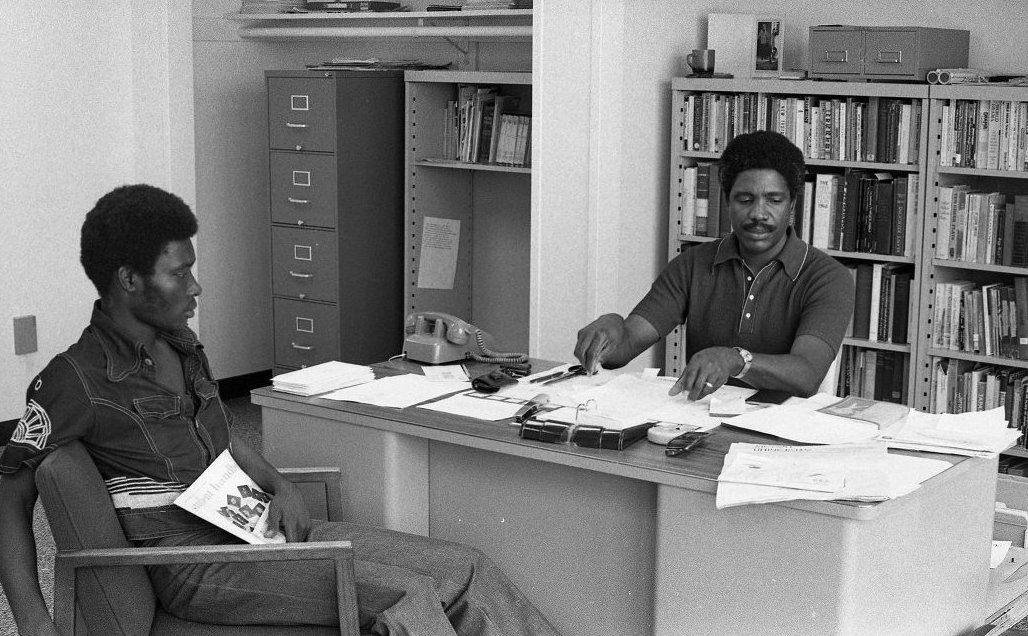
Dr. Darius Lee Swan in his office, October 28, 1977. Broadside photograph collection, #R0135, Box 15, Page 70. Special Collections Research Center
Last week we sadly found out that Dr. Darius Swann, a civil rights advocate and lifelong Presbyterian minister died at his home in nearby Burke, Virginia on March 25. Dr. Swann had been a popular and respected member of the George Mason University Faculty from 1971 to 1984. He is probably best known as the plaintiff in the 1965 Federal Court case Swann v. Charlotte-Mecklenberg Board of Education. The case, which centered on school integration in Charlotte, North Carolina, made its way to the U.S. Supreme Court in 1971, with the Court ruling finally in the Swann’s favor.
Dr. Swann arrived at George Mason College in August 1971. At that very same time Mason was the subject of an investigation by the U.S. Commission on Civil Rights regarding recruiting of minority students and faculty. George Mason was still part of the University of Virginia, and there were accusations that the college, which was about to become independent in 1972, was reluctant to adhere to then-current Affirmative Action practices. While Swann told us in a 2012 oral history that this situation concerned him, he said he still felt very good about his interview process and looked forward to teaching at Mason in the Philosophy and Religious Studies Department. In 1973 George Mason added a Drama department and Dr. Swann began teaching drama courses in addition to his other subjects.
In July 1973 Dr. Vergil Dykstra of the State University of New York at Binghamton became George Mason University’s second president. Dykstra was a Midwesterner who spent much of his previous career in northern university settings and was a strong advocate of integration and Affirmative Action. One of Dr. Dykstra’s first priorities as president was to increase the number of minority students applying to, accepted by, and enrolling at George Mason. Among other reforms initiated that fall, Dr. Swann was appointed Special Assistant to the President for Minority Affairs and was the first Mason faculty member whose sole job revolved around assisting existing minority students. Dr. Swann felt that black students attending George Mason University did not need any more academic help than white students. Rather, they simply needed a reason to be excited about being part of the university. Swann encouraged them to start student clubs and to ask the university for more Afro-centric courses and programs. The students would soon find the university very responsive to these suggestions, especially when Dr. Swann weighed in on them during discussions with members of the administration.

Dr. Darius Lee Swan meets with a student, August 31, 1974. Broadside photograph collection, #R0135, Box 9, Page 20. Special Collections Research Center
Dr. Swann suggested that a center with appropriate staffing was needed to better assist the minority students the university was now actively recruiting. The university agreed, created the Office of Minority Student Affairs, and gave Swann the authority to hire qualified staff. The Office drew upon enthusiastic staff and faculty members who helped mentor black and other minority students during their university experience, advocate for them, and foster academic and cultural programming for them. The Office of Minority Affairs is a direct precursor to today’s Office of Diversity, Inclusion, and Multicultural Education (ODIME) at George Mason.

Dr. Darius Lee Swan at his desk, October 28, 1977. Broadside photograph collection, #R0135, Box 15, Page 70. Special Collections Research Center
In 1984, Dr. Swann left the university to continue his career in a religious institution. He finally agreed to become part of the faculty at the Interdenominational Theological Center in Atlanta in 1984, after turning down three previous attempts by the Center to recruit him. We at SCRC will always remember Dr. Swann as the very soft-spoken and gentle man who visited us in 2012 to record his memories of his time here at Mason. But we are certain that the thousands of Mason students whom he inspired consider him a giant among men.
Follow SCRC on Social Media and look out for future posts in our Travel Series on our Facebook, Instagram, and Twitter accounts. To search the collections held at Special Collections Research Center, go to our website and browse the finding aids by subject or title. You may also e-mail us at speccoll@gmu.edu or call 703-993-2220 if you would like to schedule an appointment, request materials, or if you have questions. Appointments are not necessary to request and view collections


Thank you!